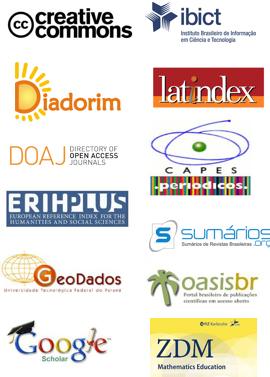Conhecimentos Profissionais do Professor Mobilizados na Resolução de Tarefas Sobre Transformações Geométricas: Relações com a Prática Reflexiva
DOI:
https://doi.org/10.17921/2176-5634.2022v15n3p261-273Resumo
Este artigo tem como objetivo identificar e discutir quais conhecimentos do professor emergem na interação com tarefas sobre o conteúdo matemático de transformações geométricas. Para tal, três professores que integram um grupo de estudos responderam a uma entrevista, acompanhada da resolução de uma tarefa matemática, cujos apontamentos foram discutidos em dois encontros em modo remoto. Os eventos críticos identificados foram analisados com o uso da ferramenta Knowledge Quartet (KQ), que por sua vez mostrou ser uma ferramenta adequada para tal. Como resultados, destacam-se lacunas na dimensão Fundamento do KQ relacionadas principalmente à definição de tarefas investigativas concebida pelos professores, e a resistência em incorporar tal tipo de tarefa na prática docente dos profissionais. Com relação ao conteúdo de transformações geométricas, destaca-se a necessidade de prosseguir enfatizando a sua importância, por meio de processos de formação continuada e tarefas, já que outros conteúdos matemáticos permanecem sendo priorizados mediante as mais variadas intercorrências, neste caso, a pandemia de Covid – 19. Sendo assim, evidencia-se a necessidade de continuar fornecendo aos professores oportunidades de desenvolverem a prática reflexiva, a fim de que ela possa ser efetivamente incorporada na atuação docente, já que se trata de uma ação que só pode ser identificada na atuação desses profissionais a longo prazo.
Palavras-chave: Conhecimento Profissional. Ensino de Geometria. Formação Continuada. Educação Matemática.
Abstract
This article aims to identify and discuss what teacher knowledges emerges in the interaction with tasks about the mathematical content of geometric transformations. For this, three teachers who are part of a study group answered an interview accompanied by the resolution of a mathematical task, whose notes were discussed in two meetings in remote mode. The critical events identified were analyzed using the Knowledge Quartet (KQ) tool, which in turn proved to be an appropriate tool for this. As results, are highlighted gaps in the KQ Foundation dimension related to the definition of investigative tasks conceived by the teachers, and the resistance to incorporate this type of task into their teaching practice. Regarding the content of geometric transformations, is highlighted the need to continue emphasizing the importance of this content, through continuous training processes and tasks, since other mathematical contents continue to be prioritized through the most varied complications, in this case, the Covid-19 pandemic. Thus, it is evident the need to continue providing teachers with opportunities to develop the reflective practice, so that it can be effectively incorporated into the teaching practice, since it is an action that can only be identified in the performance of these professionals in the long term.
Keywords: Professional Knowledge. Geometry Teaching. Continuing Education. Mathematics Education.


